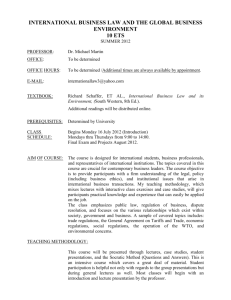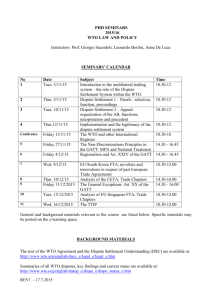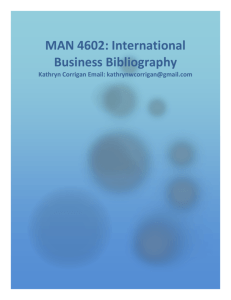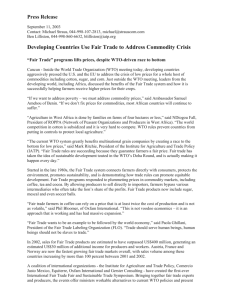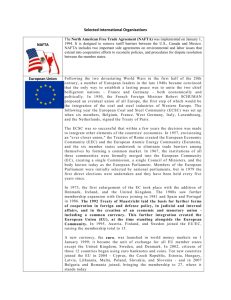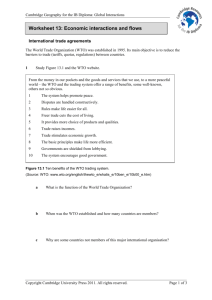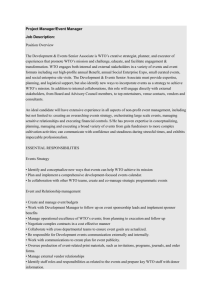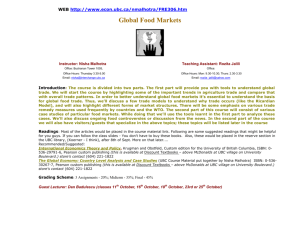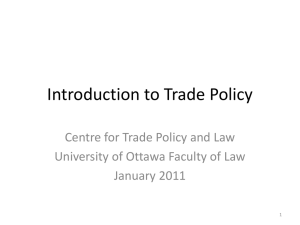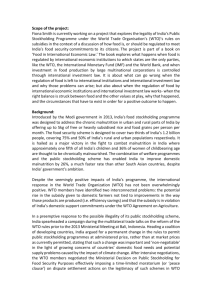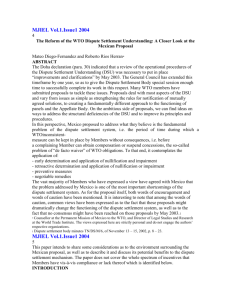Law of the World Trade Organization
advertisement
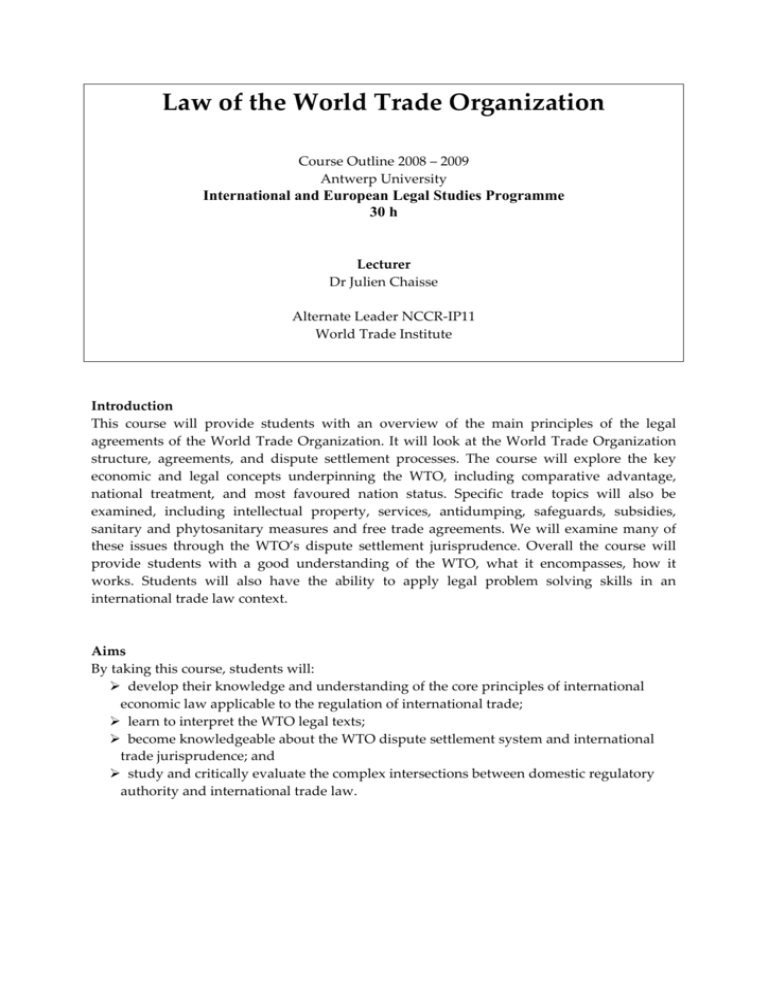
Law of the World Trade Organization Course Outline 2008 – 2009 Antwerp University International and European Legal Studies Programme 30 h Lecturer Dr Julien Chaisse Alternate Leader NCCR‐IP11 World Trade Institute Introduction This course will provide students with an overview of the main principles of the legal agreements of the World Trade Organization. It will look at the World Trade Organization structure, agreements, and dispute settlement processes. The course will explore the key economic and legal concepts underpinning the WTO, including comparative advantage, national treatment, and most favoured nation status. Specific trade topics will also be examined, including intellectual property, services, antidumping, safeguards, subsidies, sanitary and phytosanitary measures and free trade agreements. We will examine many of these issues through the WTO’s dispute settlement jurisprudence. Overall the course will provide students with a good understanding of the WTO, what it encompasses, how it works. Students will also have the ability to apply legal problem solving skills in an international trade law context. Aims By taking this course, students will: develop their knowledge and understanding of the core principles of international economic law applicable to the regulation of international trade; learn to interpret the WTO legal texts; become knowledgeable about the WTO dispute settlement system and international trade jurisprudence; and study and critically evaluate the complex intersections between domestic regulatory authority and international trade law. Course Outline Below is a very brief overview of the topics to be covered. Their order may be subject to change or adjustment. 1. The Multilateral Trading System of the WTO: An Introduction International trade regulation is a field cutting across different walks of law : domestic law (e.g.: determining rights and obligations of private actors), regional law (such as EC law, the legal framework of NAFTA or Mercosur), international or global law (WTO law provides the main framework) Trade regulation therefore consists for many countries of three layers of law: international, regional and national. We are faced with a multi-layered and complex structure. 2. The Role of Dispute Settlement WTO agreements provide extensive rights and impose many obligations on its members and on their conduct of international trade How the WTO assesses and enforces those rights and duties ? A critical part of any enforcement mechanism is an effective system to resolve disputes over what the rules mean and whether they have been broken in a specific case. 3. Constitutional Principles of WTO Most-Favoured-Nation Treatment and National Treatment. Both principles are expressions, and variations, of the idea of equality, equal treatment and non-discrimination. Economically, they seek to bring about level playing fields and fair conditions of competition for products which have different origins. 4. Regulation of Market Access The concept of « regulation of Market Access » gives attention to all the instruments regulating access to domestic markets (tariffs, quantitative restrictions, technical barriers to trade, and sanitary and phyto-sanitary measures). It primarily addresses the classical instruments applied to the importation and exportation of goods at the border. 5. Regulation of Conditions of Competition Recent trade policy instruments plainly regulate conditions on markets. Such instruments (Services, IPR, Antidumping, FDI, Government procurement…) affect goods upon customs clearance. They affect services, offered and sold within a domestic jurisdiction, to many of which no border measures apply. These regulations fully form part of domestic market regulation (not only access but competition). Here, market access is shaped in terms of conditions of competition and the granting of national treatment. This is particularly true for services. While the purpose of the GATS is market access, it essentially operates by shaping conditions of competition for foreign services and service suppliers, ranging from exclusion to equal conditions, commensurate with commitments made. Similarly, standards on intellectual property protection define conditions of competition, as do measures affecting investment, subsidies, dumping and government procurement. Course Materials A course pack will be made available for the students, containing several chapters from textbooks, and some journal articles from primary literature related to the course. Core Texts P. Van Den Bossche : The Law and Policy of the World Trade Organization: Text, Cases And Materials, Cambridge University Press 2008 (970 p.). M. Matsushita, P. Mavroidis et T. Schoenbaum (Eds): The World Trade Organization ‐ Law, Practice, and Policy, OUP 2nd edition, Oxford 2006 (1104 p.). Recommended readings P. Banerjee, D. Chakraborty, D. Sengupta (Eds.) : Beyond the Transition Phase of World Trade Organisation: An Indian Perspective on Emerging Issues, Academic Foundation, New Delhi 2006 (683 p.). E. Canal‐Forgues : Le règlement des différends à l’OMC, Bruylant – 3ème édition, Brussels 2008 (209 p.). J. Chaisse, T. Balmelli (Eds): Essays on the Future of the WTO. Policies and Legal Issues (Volume 1) and The WTO Judicial System: Contributions and Challenges (Volume 2), EDIS, Geneva, 2008 (480 p. and 384 p.). T. Cottier, M. Oesch: International Trade Regulation, Cameron May, 2006 (1072 p.). D. Palmeter, P. Mavroidis : Dispute Settlement in the World Trade Organization – Practice and Procedure, 2nd edition, Cambridge University Press 2004 (348 p.). E.‐U. Petersmann, M. Pollack : Transatlantic Economic Disputes – The EU, the US and the WTO, International Economic Law Series, Oxford University Press, Oxford 2003 (632 p.). J. Waincymer : WTO Litigation : Procedural Aspects of Formal Dispute Settlement, Cameron May 2002 (935 p.). Websites World Trade Organization (WTO) http://www.wto.org WTO Documents Online (Dispute Settlement, General Council...) http://docsonline.wto.org Research and Publications of the World Trade Institute ‐ NCCR Trade Regulation http://www.nccr‐trade.org and http://www.wti.org Global Trade Negotiations Homepage (Harvard) http://www.cid.harvard.edu/cidtrade WorldTradeLaw.net http://www.worldtradelaw.net World Trade Online http://www.insidetrade.com European Commission, DG Trade http://ec.europa.eu/trade Office of the United States Trade Representative (USTR) http://www.ustr.gov WTO/GATT Research http://www.llrx.com/features/wto2.htm ASIL Guide to Electronic Resources for International Law http://www.asil.org/resource/iel1.htm
